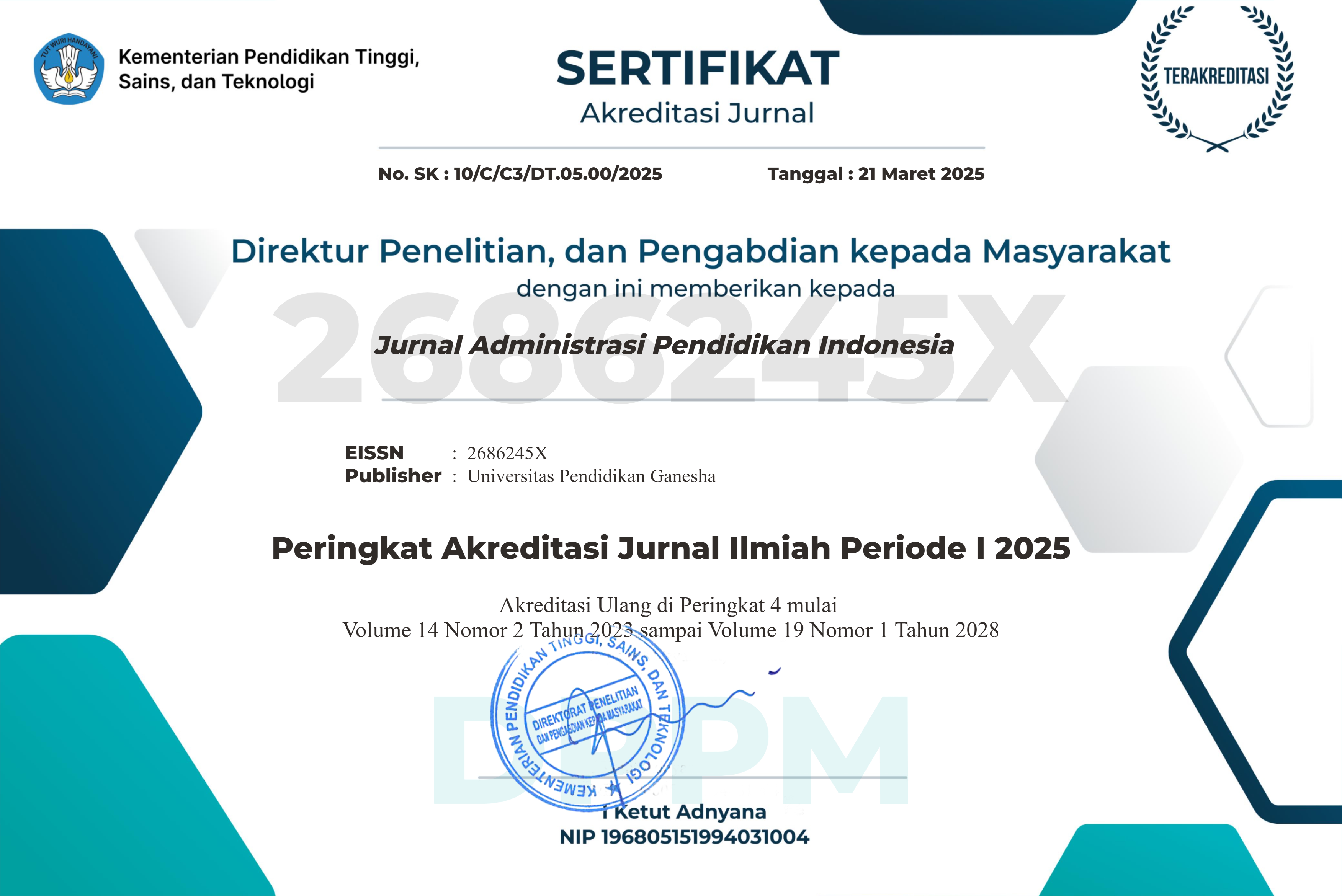Study of Evaluation of the Implementation of E-Learning-Assisted Economic Learning at SMA Negeri 6 Denpasar
DOI:
https://doi.org/10.23887/jurnal_ap.v14i1.1833Keywords:
CIPP, E-Learning, study evaluationAbstract
This study aimed to determine the results of evaluations separately or together on context, input, process, product and problems that occur in the implementation of economic learning assisted by e-learning at SMA Negeri 6 Denpasar. This research is a program evaluation research using CIPP model. The sample of this study consisted of 85 students and 2 teachers of economics at SMA Negeri 6 Denpasar. Context, input, process, product data in this study were collected using a questionnaire using a Likert scale of 1-5. The data analysis method used in this study is a quantitative descriptive analysis method. To determine the effectiveness of implementing the economic learning assisted by e-learning, the raw scores were transformed into Z-scores, then into T-scores, then verified into the Glickman Quadrant. Based on the research that has been done, the results show that: 1) The effectiveness of the implementation of economic learning assisted by e-learning in terms of the context obtained effective results (+), 2) The effectiveness of the implementation of economic learning assisted by e-learning in terms of the input obtained effective results (+), 3) The effectiveness of the implementation of economic learning assisted by e-learning in terms of the process obtained less effective results (-), 4) The effectiveness of the implementation of economic learning assisted by e-learning in terms of the product obtained effective results (+), 5) The results of a joint evaluation of the implementation of economic learning assisted by e-learning in terms of context, input, process, product obtained effective results (+ + - +), and 6) The problems faced in implementing e-learning assisted economic learning are 1) lack of support for facilities and infrastructure, 2) lack of student attendance, 3) many students submit assignments not on time, 4) students do not access the material provided, 5) lack of training regarding e-learning assisted learning, and 6) teachers lack time to explain the material.
References
Ahsan, M., Herdahb, & Rahman, A. (2020). Kesiapan Dosen dan Mahasiswa dalam Pembelajaran Berbasis E-Learning di IAIN Parepare (Evaluasi Program Model CIPP). Jurnal Pendidikan Islam, 18(2), 303–319. https://ejurnal.iainpare.ac.id/index.php/alislah/ article/view/2016/867
Arikunto, S., & Jabar. (2014). Evaluasi Program Pendidikan, Pedoman Teoritis dan Praktis bagi Mahasiswa dan Praktisi Pendidikan. Jakarta: Bumi Aksara.
Budi Yoga Bhakti. (2017). Evaluasi Program Model CIPP Pada Proses. Jurnal Inovasi Pendidikan Fisika Dan Riset Ilmiah, 1(2), 75–82.
Izzudin, M. A., Baalwi, M. A., & Thoufan, M. F. A. (2021). Evaluasi Pelaksanaan Pembelajaran Online ( E-Learning ) Selama Masa Pandemi COVID-19 di SDI Sabilillah. Trapsila: Jurnal Pendidikan Dasar, 3(1), 80–90.
Marta, R. (2018). Evaluasi Implementasi Pembelajaran Keterampilan Komputer Dan Pengolahan Informasi (Kkpi) Kpi Berbasis E-Learning. Jurnal Teknologi Informasi Dan Pendidikan, 11(1), 43–56. https://doi.org/10.24036/tip.v11i1.96
Oktaria, Sheren Dwi, H. (2020). EVALUASI PENERAPAN PEMBELAJARAN ONLINE MENGGUNAKAN E- LEARNING DI MASA PANDEMI COVID-19 PADA TINGKAT PERGURUAN TINGGI Sheren Dwi Oktaria 1) , Hadiwinarto 2). Jaeducation, 0581(1), 24–29. http://jurnal.um-palembang.ac.id/jaeducation
Prayogo, D. (2020). Evaluasi Distance Learning Mata Kuliah Ilmu Bahan Saat Pandemi Covid-19 Menggunakan Model CIPP. Jurnal Pendidikan Teknik Mesin, 7(2), 92–98. https://ejournal.unsri.ac.id/index.php/ptm/article/view/11898%0Ahttps://ejournal.unsri.ac.id/index.php/ptm/article/download/11898/5782
Riyanda, A. R., Herlina, K., & Wicaksono, B. A. (2020). Evaluasi Implementasi Sistem Pembelajaran Daring Fakultas Keguruan dan Ilmu Pendidikan Universitas Lampung. Jurnal IKRA-ITH Humaniora, 4(1), 66–71. https://journals.upi-yai.ac.id/index.php/ikraith-humaniora/article/view/669
Rizandi, M., Puspita, D., Fatimah, M., Cantika, N., & Purnama, W. (2021). Jurnal Fundadikdas ( Fundamental Pendidikan Dasar ) Evaluasi pembelajaran daring melalui media WhatsApp di SD N 16 Evaluation of Online Learning Using WhatsApp Media at SD N 16 Toboali. 4(2), 63–80.
Stufflebeam, D. L. (2000). The CIPP Model For Evaluation. Kluwer Academic Publishers.
Suparto, S. P. (2012). Evaluasi progam e-learning bagi petugas lapangan. FIP Universitas Negeri Jakarta, 21(3), 112–128. https://journal.uny.ac.id/index.php/cp/article/view /1470/pdf
Syifa, A. (2020). Evaluasi Penerapan E-Learning Melalui Model Cipp Di Program Studi Psikologi Islam Iain Pontianak. Jurnal As-Salam, 4(2), 180–194. https://doi.org/ 10.37249/as-salam.v4i2.210
Tsani, I., Arsyadana, A., Sufirmansyah, & Shafira, E. (2021). Evaluasi Model CIPP Pada Pembelajaran PAI dan Budi Pekerti di SMA Negeri 7 Kota Kediri. Al-Tadzkiyyah: Jurnal Pendidikan Islam, 12(1), 17–45. http://ejournal.radenintan.ac.id/index.php/tadzkiyyah/a rticle/view/8165/4594
Wakano, A., Prihono, E. W., Hasanah, N., & ... (2021). Evaluasi sistem pembelajaran online dimasa pandemi covid-19. … Penelitian Hukum Dan …, 20(1), 1195–1205. https://jurnal.iain-bone.ac.id/index.php/ekspose/article/view/1380











